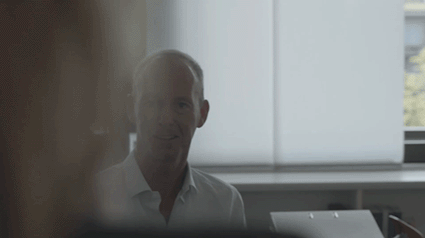Interview with
Thomas Rabe
Thomas Rabe
Thomas Rabe
Chairman and CEO of Bertelsmann
Chairman and CEO of Bertelsmann
Thomas Rabe
Chairman and CEO of Bertelsmann
Chairman and CEO of Bertelsmann
In this interview, Bertelsmann Chairman and CEO Thomas Rabe talks about the past financial year 2021, the “Boost 2025” growth initiative and 10 years at the helm of Bertelsmann.
»Five to Seven Billion Euros to Invest for ‘Boost 2025’«
Mr. Rabe, how did financial year 2021 go for Bertelsmann?
Really well – 2021 has been the strongest year in the 187-year history of our company.
Revenues grew organically by double digits, to €18.7 billion. At €3.2 billion – or €3.4 billion before investments in
streaming – our operating result reached a record level, mainly thanks to our three strong revenue pillars: RTL Group,
Penguin Random House and Arvato, which are flanked by three sprinters that are developing rapidly: BMG,
Bertelsmann Education Group and Bertelsmann Investments. At the same time, consolidated net income rose to
€2.3 billion, and net financial debt dropped below €1 billion. In concrete terms, this means that, unlike in the past,
capital is no longer a limiting factor for our company. On the contrary: Bertelsmann currently has a high-investment capacity.
And this is now going to your “Boost” initiatives?
That – and much more. Bertelsmann will invest a total of between 5 and 7 billion euros in its
businesses worldwide by 2025 under its Boost growth initiative.
What do you hope to achieve with “Boost 2025”?
The business aim is to grow even more strongly and become even more profitable. So, our
goal is to achieve a significantly higher level of revenues and earnings for Bertelsmann by 2025. We have precisely
defined our growth targets along our five strategic priorities.
What exactly does that mean?
In 2021, the national media champions recorded sales of €5 billion, and we expect
this to grow by 5 percent a year. Our global content businesses generated €6.6 billion; we anticipate growth of 5 to
10 percent a year. Global services, which now generate €5 billion in revenues, are also expected to grow by 5 to 10 percent
a year, and online education by more than 10 percent, from currently €0.3 billion. And in the case of our shareholdings,
we expect a 15 percent per year increase in the return on invested capital.
Those are ambitious goals...
But they are achievable. In recent months, all of our divisions have defined
their growth potential and identified specific projects which we will now implement step by step. They are a mix
of large, medium and smaller investment projects. From 2024, in the next stage of the “Boost” initiative, we will
then turn our attention to additional new lines of business and growth areas.
Which ones might they be?
We have our eye on several exciting fields, all of which would be a good fit for
Bertelsmann. One of them is Digital Health. The healthcare market has huge potential worldwide and it is growing steadily.
Not least because of the pandemic, the digitalization of the field is accelerating. Digital offerings improve medical
treatment and reduce costs. With its long-term orientation, expertise and willingness to explore new paths, Bertelsmann
is practically predestined to tap into this market. And with companies like Relias, Alliant, Afya, Arvato SCS Healthcare
and BFS Health Finance, we already have a lot of experience to build on.
Let’s return to “Boost” for a moment – where did the name come from?
The idea was sparked by my favorite running shoe, the Adidas Ultra Boost. Just as the
perfect running shoe can eke that extra bit of performance out of a runner, this will give Bertelsmann the crucial push.
And I’ve already said repeatedly that since I took office 10 years ago, we’ve been in a marathon on our way to becoming
a high-growth, digital, international and diversified Bertelsmann. So “Boost” fits quite well.
As you just said, you’ve been CEO of Bertelsmann for 10 years, and your third five-year term began in January 2022. Was there a highlight in the first 10 years?
In such a long time, there have of course been many highlights. The most important
is undoubtedly that, together, we have succeeded in making Bertelsmann as strong as it is today – with a very high-quality
business portfolio. In my view, the entrepreneurial milestones include the consolidation of the TV businesses that we
initiated, the establishment of BMG, the education business and Bertelsmann Investments, and the realignment of Arvato
and of the printing business. And, of course, the founding and expansion of Penguin Random House. I would be delighted
if this path could now be completed with the acquisition of Simon & Schuster.
Are you confident about that happening?
Unfortunately, we have encountered unexpected difficulties. We are sorry to see that
the US Department of Justice wants to block the acquisition. But we are confident of winning the upcoming court case.
We feel the facts are on our side. We expect a decision in the course of the year.
What else do you expect from the current financial year?
Its start was good. For 2022, we expect another increase in revenue and continued high
operating profitability. All this is subject to further global political, economic and pandemic developments. And no one
can reliably assess these at present. But completely irrespective of our own company’s performance, we would like nothing
better than to see an end to war, suffering and the plight of refugees in Europe.









